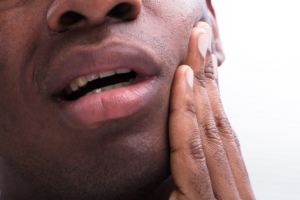 If you struggle with breathing, sleeping, or even swallowing properly, myofunctional therapy could be the solution. In today’s blog, we have a family dentist in Denver, CO, explain how this therapy can improve your oral and overall health.
If you struggle with breathing, sleeping, or even swallowing properly, myofunctional therapy could be the solution. In today’s blog, we have a family dentist in Denver, CO, explain how this therapy can improve your oral and overall health.
Would you like to learn more about myofunctional therapy from an experienced dentist in Denver, CO? Schedule a consultation at Metropolitan Dental Care! Our team can assess your needs and determine if this therapy is an ideal solution for you. So, give us a call at (303) 534-2626 to reserve your appointment now.
What Is Myofunctional Therapy?
Myofunctional therapy is a set of exercises designed to facilitate the proper movement and function of the tongue, throat, and facial muscles. It helps correct improper habits that affect breathing, chewing, speaking, and sleeping.
1. Improves Breathing and Reduces Mouth Breathing
Breathing through the nose is essential for good health. Chronic mouth breathing, however, can lead to dry mouth, bad breath, and even sleep issues.
Myofunctional therapy helps strengthen muscles to encourage nasal breathing, leading to better oxygen flow and improved overall wellness.
2. Enhances Sleep Quality and Reduces Snoring
Snoring and sleep apnea often result from weak tongue and throat muscles. However, there is evidence to suggest that strengthening oral muscles through myofunctional therapy can help keep the airway open during sleep. The result is fewer interruptions during the night, leading to more restful sleep.
3. Supports Proper Tongue Posture
A resting tongue should sit against the roof of the mouth, not lie low or push against teeth. Poor tongue posture can lead to dental and jaw issues.
Luckily, myofunctional therapy teaches the tongue to rest correctly, which can improve breathing, swallowing, and even speech.
4. Encourages Better Facial Development in Children
For children, myofunctional therapy can guide proper facial growth. Poor oral habits, like thumb-sucking or prolonged pacifier use, can affect jaw alignment.
This therapy, however, helps correct these habits early, reducing the need for braces or orthodontic treatments later.
5. Aids in Orthodontic Treatment Success
Braces and aligners straighten teeth, but strong oral muscles help maintain the results. That’s right – strengthening the tongue and facial muscles can prevent teeth from shifting back after treatment.
So, for optimal and long-lasting results, a dentist in Denver, CO, may recommend myofunctional therapy alongside orthodontic care.
6. Improves Digestion and Swallowing
Chewing and swallowing are essential parts of digestion. Weak tongue and facial muscles can make swallowing difficult, leading to digestive discomfort.
Fortunately, myofunctional therapy retrains these muscles for better chewing, smoother swallowing, and optimal digestion.
7. Enhances Speech Clarity
Speech problems, like lisps or difficulty pronouncing certain sounds, often result from tongue placement issues. Myofunctional therapy strengthens the tongue and improves control, helping patients speak more clearly and confidently.
Is Myofunctional Therapy Right for You?
A dentist in Denver, CO, can evaluate your needs and determine if myofunctional therapy is a good fit. Whether you’re dealing with sleep issues, speech difficulties, mouth breathing, or orthodontic concerns, this therapy offers long-term benefits.
Take the First Step – Talk to a Dentist in Denver, CO, Today!
If you’re interested in improving your breathing, sleep, or oral health, then it’s time to consider myofunctional therapy. Click here to request a consultation at Metropolitan Dental Care, or call (303) 534-2626 to talk to a trusted dentist in Denver, CO, today!

